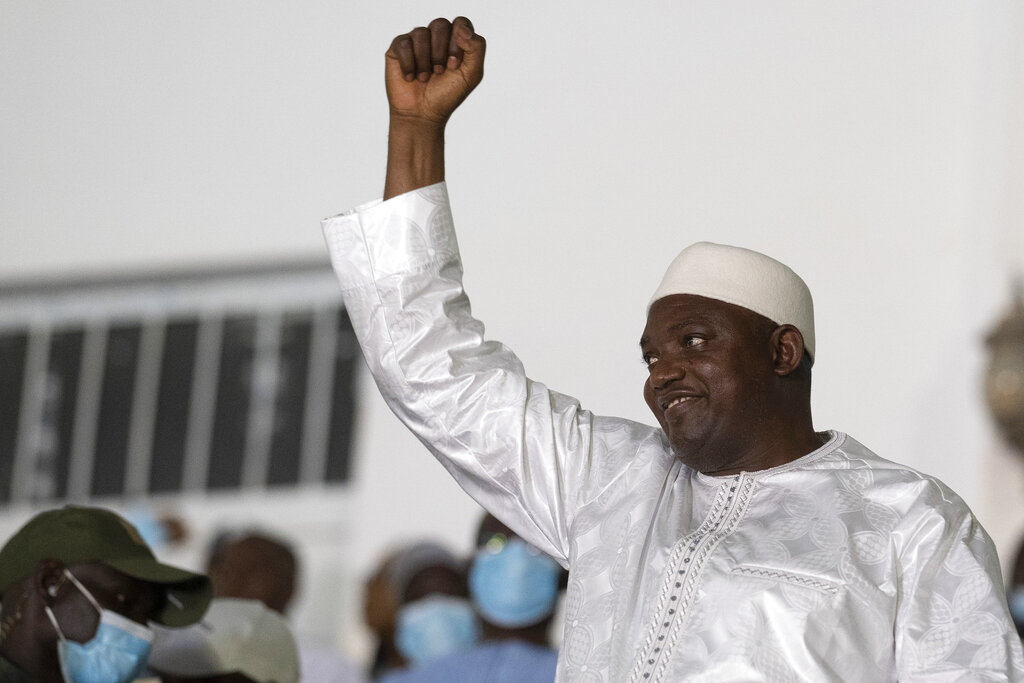ADF STAFF
There was no gunfire in Banjul, the capital of The Gambia, on December 20, 2022, or the next day when the government announced it had thwarted an attempted coup.
What began with rumors ended with an official statement.
“Based on intelligence reports, some soldiers of the Gambian army were plotting to overthrow the democratically elected government of President Adama Barrow,” it read.
“The GAF [Gambian Armed Forces] High Command, in a swift military operation conducted yesterday, arrested four soldiers linked to this alleged coup plot.”
The Gambia announced on December 27 that an 11-member investigative panel would investigate and report on the coup attempt. Its findings, expected after 30 days, have not been made public.
Thus far, the investigation has yielded charges against two civilians, one police officer and eight soldiers, one of whom remains at large. The other 10 accused are in jail.
National security advisor Abubakarr Suleiman Jeng told reporters on December 29 that the perpetrators intended to “arrest cabinet ministers and senior government officials to use them as hostages to prevent any foreign intervention.”
“They also had plans to retire all senior military officers from the rank of major and above and restructure [the army].”
Barrow finally addressed the news in his customary New Year’s Eve address broadcast on national television.
“It is regrettable that a handful of soldiers recently planned to overthrow the democratically elected government of the day,” he said. “The devastating consequences of illegally overthrowing a constitutionally elected government can never justify the means employed, nor the ill-advised purposes for such deadly crimes.
“Gambians have lived through a military regime, and they know how military takeovers have destabilized, disunited and isolated countries within the subregion that struggle to live with them.”
Although Barrow’s government has produced some details, there are no indications of what motivated the coup attempt.
Theories are plentiful.
David Aworawo, professor of international relations and strategic studies at the University of Lagos in Nigeria, suggested it might simply have been a matter of imitating recent coups in the region.
West Africa has had an outbreak of coups and attempts over the past two years. Military juntas seized power in Burkina Faso, Guinea and Mali, and Guinea-Bissau’s government averted an attempted coup in February 2022.
The Gambia also has a history of coups. Barrow’s predecessor, Yahya Jammeh, took power in a bloodless military coup in 1994 and survived multiple coup attempts before his ouster in 2016.
Living in exile in Equatorial Guinea, Jammeh remains a factor in The Gambia’s polarized politics.
Aworawo said Barrow’s lack of confidence in the military could have played a role in the coup attempt.
Several senior officers stepped down from the Gambia National Army when Barrow took office in 2017, resulting in an uneasy relationship between the president and the armed forces.
“In 2017, he was sworn in in Senegal, not even in Gambia itself,” Aworawo said in an interview with Nigerian news channel TVC News. “Since then, we have had elements in the military loyal to Yahya Jammeh trying to cause problems for Barrow.”
Barrow employs Senegalese troops to provide his personal security. The Gambia’s international airport and its primary seaport are guarded by Nigerian and Ghanaian forces, respectively, according to the BBC.
The presence of foreign Soldiers has been unpopular, but Barrow easily won re-election in December 2021, garnering 53% of the vote.
Gambian political analyst Sait Matty Jaw, executive director of the Banjul-based Center for Research and Policy Development, was shocked by the attempted coup and said some have questioned its authenticity.
Barrow’s administration faces several thorny issues, Jaw said.
“People are frustrated about the limited progress that has been made since the departure of Jammeh, and there’s still no constitution,” he told Voice of America. “A lot of people are blaming this incident on the lack of reform in the security sector.”
Jaw said Gambians are worried about the country’s economy, but they generally do not support military involvement in the country’s political affairs.
“There are so many other issues people are worried about,” he said. “We also know that the majority of Gambians are anti-coup based on survey data.”
Aworawo also put forth the theory that poverty has fueled discontent in The Gambia.
“Inflation is still very high in the country, economic problems are still very extensive, and quality of life is still very low,” he said. “We have had protests. So, the optimism of 2017 has given way to pessimism, and hope has given way to despair.”

